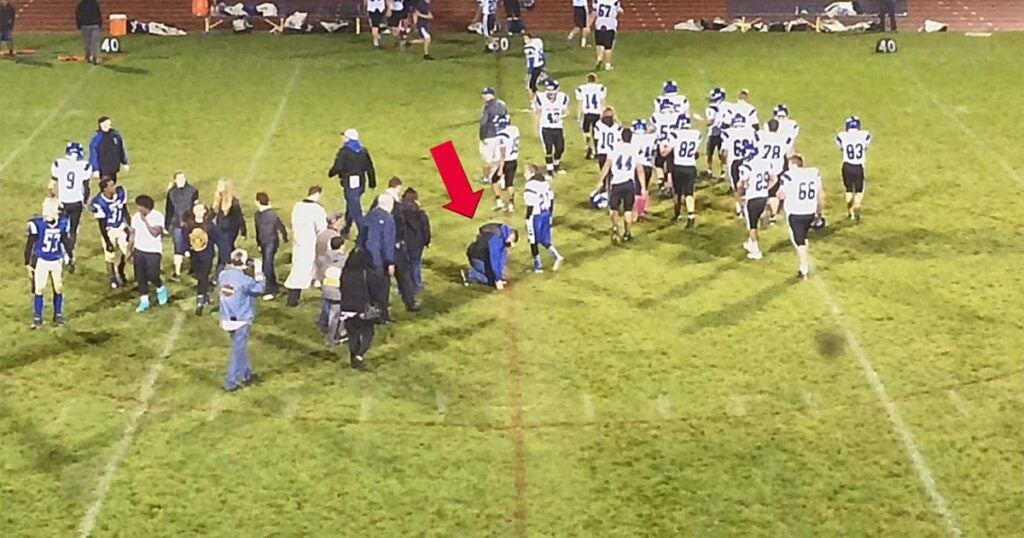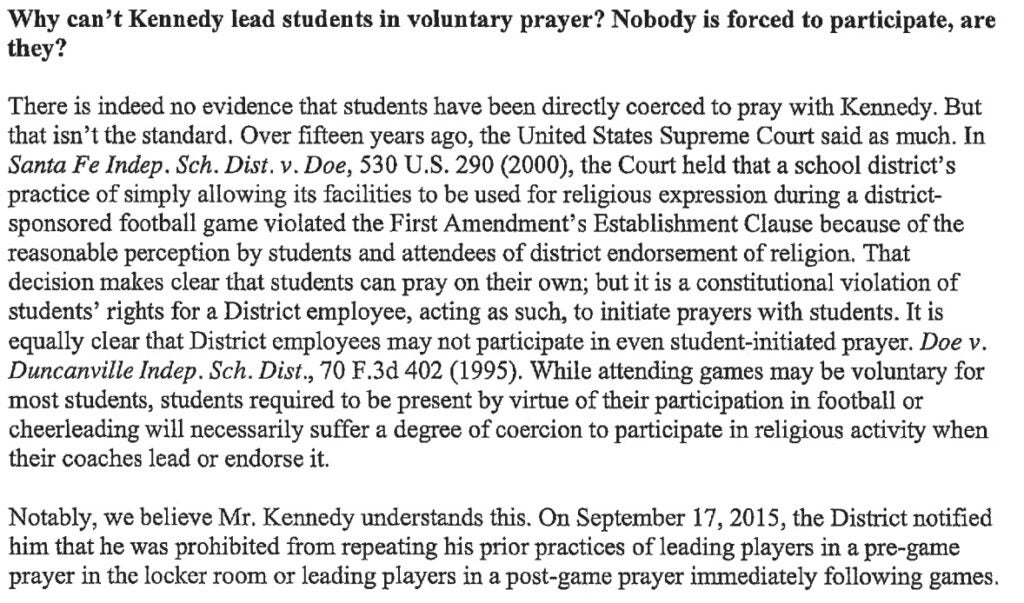From Football Field to Supreme Court: Meet the Coach Who’s Fighting for Freedom to Pray
Virginia Allen /
BREMERTON, Washington—It’s the final play of coach Joe Kennedy’s seven-year legal battle.
The Supreme Court will hear oral arguments Monday in Kennedy’s case, and ultimately decide whether a public school employee is allowed to participate in silent prayer in view of students while on the clock.
“The only thing I’m asking the Supreme Court is that I get to be a coach, and I get to thank God afterwards,” Kennedy says.
In 2015, Kennedy lost his job as an assistant football coach at a high school in Washington state after taking a knee in silent prayer on the 50-yard line after games.
From the time he began coaching in 2008 at Bremerton High School, about 30 miles west of Seattle, Kennedy made it his practice to thank God after every game.
“I had a covenant with God from the very beginning when I accepted the [coaching] job that I would give him the credit, and thank him after every game, win or lose,” Kennedy told The Daily Signal during an exclusive interview in Bremerton last month.
Kennedy, 52, says he does not remember the first time he prayed on the 50-yard line, because “it was not a big deal, it was just me going out there and taking a knee by myself, and giving thanks for what the players just did.”
Eventually, players became curious about what Kennedy was doing at the end of every game, and some asked whether they could join him.
“This is a free country, it’s America, you can do whatever you want to do,” Kennedy remembers telling his players.
Ending Prayer With Players
Praying after games grew to be a regular practice, in which Kennedy would give a brief motivational speech to his players that also included a brief prayer. He did so through several football seasons, before the Bremerton School District learned of it and told the coach that he no longer could pray with his players.
No one had filed a complaint about the prayers, but Kennedy agreed to end the practice. He told The Daily Signal that he “never prayed with the kids ever again.”
But the coach did continue his practice of praying alone in the middle of the field after football games.
“The prayers, how long they were, I would say probably [they] averaged eight to 12 seconds,” Kennedy said. “I mean, I’m not a great prayer of a guy. It was really, ‘Thank you, God, for what these young men just did on the field, and thank you for letting me be a part of it.’”

As Kennedy continued to pray on the field during the 2015 season, he recalls, “the school lawyers got involved, and they kind of kept moving the goal post, and they told me that I could no longer pray even by myself if people could see me.”
In an effort to accommodate Kennedy’s desire to pray after games, the school district said in a public document, officials offered the coach several private locations to “use for prayer,” including “within the school building or athletic facility, or even in the Memorial Stadium press box.”
Kennedy did not find these options satisfactory, as they would require him to exit the field, walk to the designated area, and then return to his players. The coach says that would have taken too much time directly following a game, when he still had responsibilities to players and fellow coaches.
The Bremerton School District placed Kennedy on administrative leave when he refused to stop praying on the 50-yard line.
At the end of the season, Kennedy said, his personnel evaluation read, “in great, big, bold letters … , ‘Do not rehire.’”
‘A No-Brainer’
That’s when the coach decided he was going to file a lawsuit against the school district.
“When they told me that, I had to pick between my faith and my job, that was a no-brainer, and I stood up and fought,” Kennedy said.
The suit has risen through the court system over seven years. After the U.S. Court of Appeals for the 9th Circuit ruled in favor of the school district, Kennedy appealed to the U.S. Supreme Court.
In January, the high court announced it would hear Kennedy’s case. He is represented by the nonprofit First Liberty, a nationwide religious liberty legal organization.
The Supreme Court is “deciding a very narrow question, which is whether or not [a football coach] can be fired from their job if [he] engages in a private prayer on one knee at the 50-yard line,” Jeremy Dys, an attorney for First Liberty, told The Daily Signal.
“Kennedy did not surrender his First Amendment rights at the schoolhouse gate,” Sarah Parshall Perry, a legal fellow at The Heritage Foundation, said. “The Supreme Court has continuously reaffirmed that principle since its 1969 decision, Tinker v. Des Moines.”
The Daily Signal, which has followed Kennedy’s case since 2015, is the multimedia news organization of The Heritage Foundation.
Perry said she sees reason for Kennedy to be optimistic about the high court, which now has a 6-3 conservative majority under Chief Justice John Roberts.
“The Roberts court has previously said that in this case, the 9th Circuit’s understanding of the free speech rights of public school teachers is troubling and might justify future review,” Perry said, adding, “Thankfully, that time is now.”
‘Deceitful Narrative’
Americans United for Separation of Church and State, a nonprofit legal organization, is representing the Bremerton School District before the Supreme Court.
The legal group responded to The Daily Signal’s request for comment with a written statement:
Mr. Kennedy’s attorneys continue to present a deceitful narrative to the court because they know the facts of the case, the laws of our country, and religious and nonreligious Americans alike are on the side of protecting students’ religious freedom.
The law is clear that teachers and coaches cannot lead public school students in prayer. That’s what makes this case so urgent—a loss would dangerously erode church-state separation, a core principle of our democracy.
On its website, Americans United for Separation of Church and State says that Kennedy “violated the religious freedom of his players by pressuring them to join his public prayers at the 50-yard line at their football games.”
On Oct. 28, 2015, while Kennedy was on administrative leave but still an employee of the Bremerton School District, the district issued a “Q&A Regarding Assistant Football Coach Joe Kennedy.”
The second question in the document reads: “Why can’t Kennedy lead students in voluntary prayer? Nobody is forced to participate, are they?”
The school district answered by writing: “There is indeed no evidence students have been directly coerced to pray with Kennedy.”

‘Got to Keep Going’
In an email dated Oct. 21, 2015, Bremerton School Superintendent Aaron Leavell informed Randy Dorn, then Washington state’s superintendent of schools, that the “issue” regarding Kennedy and prayer had “shifted.”
“The issue is quickly changing as it has shifted from leading prayer with student athletes, to a coaches’ right to conduct a personal, private prayer … on the 50-yard line,” Leavell said.
If faced with the decision again, Kennedy told The Daily Signal, he still would take a knee in prayer at the end of football games.
“There would be no doubt in my mind; I would still do it, even if I had to go through all this again,” Kennedy said. “Giving up your faith, it’s not something I’m going to give up on. And I’m not going to give up on the fight for everybody’s rights. Nobody should have to worry about being fired for their faith.”
The Supreme Court is expected to issue its decision in Kennedy’s case before recessing in late June or early July.
“This legal battle, it’s worn on me,” Kennedy rold The Daily Signal. “I mean, I’m a little bit grayer. It’s been really tough.”
But, he said, in the “third and fourth quarter of a football game, you’ve got to keep going.”
The coach added:
I don’t care how tired you are, I don’t care how painful it is. You’ve just got to keep going and you’ve got to finish, if there’s still time on the clock. That’s what I’ve always coached, and now I have to actually live by it.
Editor’s note: The description of First Liberty was updated in this article.
Have an opinion about this article? To sound off, please email letters@DailySignal.com and we’ll consider publishing your edited remarks in our regular “We Hear You” feature. Remember to include the url or headline of the article plus your name and town and/or state.
